#and we can extrapolate from that all we want! but he was a real living person and that is ALL that's left of him! he's simply gone
Explore tagged Tumblr posts
Text
an epiphany: Silver does not, and cannot, have a backstory, simply because he is the archetypal pirate. and pirates do not have histories.
I do a lot of research on pirate history in my free time, and one thing that has always really struck me is just how little we have to go off of. We do have primary source records of their exploits - primarily reports from the crews of ships they attacked, and if they were unlucky enough, transcripts from their trials and executions , but as soon as you ask "well, who were they before they were pirates?", almost always, there is simply nothing to draw up, even for the most famous of figures. Calico Jack Rackham appears on the scene in 1718, already Charles Vane's quartermaster, with nothing to say of where he came from. Samuel Bellamy sailed from Cape Cod to raid the treasure-wreck of the Urca d'Lima, but his life in Massachusetts is marred in speculation. Blackbeard made landfall in Nassau soon after the War of Spanish Succession, but so many pirates used pseudonyms that we cannot even be sure that his real name was Edward Teach. All we can say is maybe, maybe, maybe.
so of course Silver, being the icon that we can trace nearly all of our modern conceptions of piracy to, would have no past. the real ones didn't either. As far as written history is concerned, the sea conjured them up. Even if their stories were not unremarkable, they were simply... without relevance.
#this is why i get so emotional about Dennis McCarthy (c.1690- 11:00 AM December 12 1718 RIP)#the only reason we know he lived is because he died! ALL we have is a record that he signed a pardon and then his trial proceedings#and we can extrapolate from that all we want! but he was a real living person and that is ALL that's left of him! he's simply gone#i cant stand it#--------#anyway#the only pirates we DO have detailed info about are ones that were wealthy well-named and landed prior to becoming pirates#like William Kidd - Stede Bonnet - and Henry Jennings#privilege didn't just buy you your life. it bought you your memory.#everyone else had to fight for the scraps of legacy#legacy that was already being transmuted into myth long before the nooses even tightened#black sails#john silver
176 notes
·
View notes
Note
Wanted to ask, is Eridan's relationship with his dad ok? Like when Eridan was learning how to use his harpoon gun he seemed very much distressed and not enjoying any of it
The only real canon characterization we have of seahorsedad is that the version of him that's Cronus's lusus is "stern, fatherly" and that he ditches Cronus for Hussie, although that last one is mostly just a Bit so I don't really count it as characterization. He's also willing to go along with Eridan "doing something ridiculous," though, again, that's kind of a Bit and it's unclear how canon that is.
((cw for abuse and stuff beneath the readmore))
As such, pretty much anything I say is going to be pure extrapolation that serves my characterization of Eridan, and I can't really back it up with hard textual evidence. But, personally, I think Eridan believes his relationship with his lusus is "good" in the way that many children growing up beneath strict, emotionally neglectful, and even outright abusive parents do.
We know that Eridan has very few friends. He doesn't even really talk to half the people in their group chat, and according to Feferi, he's never spent more than a few days underwater, total, in his whole life. Add onto that that lusus murder (and, by extension, the culling of the orphaned troll) has been his duty long enough that he describes it is "the only thing i evver did," I think it's a reasonable assumption to make that he also has no IRL friends, aside from Feferi.

And to give an idea of how old Eridan was when he started having to murder lusii, here's how old Vriska was when she was expected to start feeding spidermom:
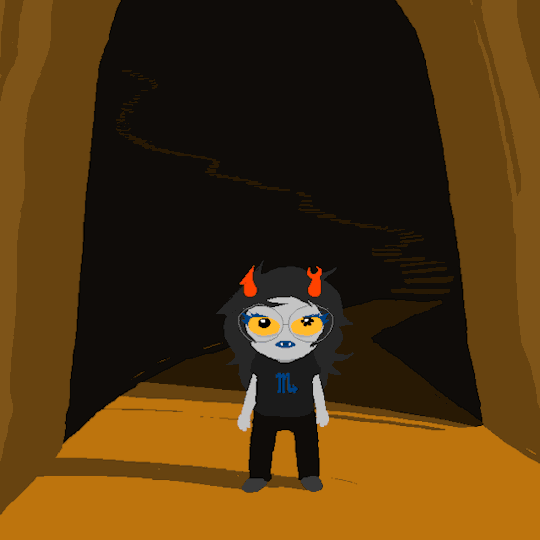
This, and the fact that Dualscar was called "Orphaner" because the job of feeding Gl'bgolyb was his even into adulthood (as he lived before the Summoner's rebellion and the removal of adult trolls from Alternia), and the fact that no one, including Feferi, ever shows any gratitude towards Eridan for performing the job, supports the idea that feeding Gl'bgolyb has always been a violet blood's responsibility. After all, Feferi makes overtures about not being better than other trolls, but she sure does revel in being royalty when she can get away with it. It'd be in character for her to not be particularly grateful to Eridan because she sees lusus murder as fundamentally being his responsibility, especially if he started when they were both REALLY young.

In other words, Eridan was expected to start murdering lusii (and by extension, other trolls) from the moment he was old enough to do so, which, judging by how old Vriska was when she started killing trolls for Spidermom, is not very old at all.
Also, given the lifespan of violet bloods, it's entirely possible - and my personal belief - that Seahorsedad was Dualscar's lusus as well as Eridan's. Even without that being the case, since it was always Eridan's job to hunt and kill lusii, the biggest possible culprit for inducting him into his role would be his lusus.
And let's be clear, I think the fact that having to murder lusii/trolls is the biggest culprit for what's fucked Eridan up the most. The pressure of having the safety of the entire race on his shoulders, the fear of Gl'bgolyb and what happens if he ever fails, and the guilt of taking lives (which we do know Eridan thinks about) have left him with genuine struggles caring about other people, a nasty martyr complex (which isn't unjustified), extremely unstable and negative emotions, shattered interpersonal relationships, and a deep, nihilistic sense of resignation towards his place in society. The latter has directly led to him attempting to embrace that place by tricking himself into thinking he believes in hemocasteist, sea dweller supremacy rhetoric - which his actions contradict - because, without the game's intervention, he had no other options available for him but to become a key figure in the imperial army, continue murdering other sapient creatures until he died, and watch all his few friends die before him, either when they got culled, killed on the battlefield, or purely dropped dead of old age.
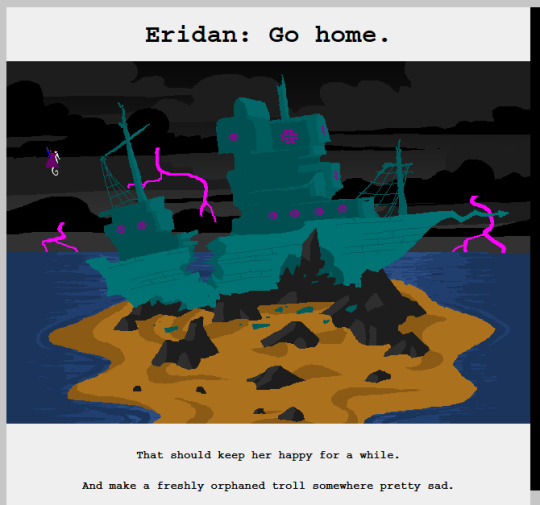
And, like... a parent who does that to their child, even if we assume the absolute best (that Seahorsedad does genuinely care about Eridan), can't possibly have a fully healthy relationship with said child. And I think it's not unreasonable to assume that the best is not what's happening between Eridan and Seahorsedad, because Eridan's psychological profile is so fucked up that I highly doubt he was receiving much, if any, actual affection or support from his lusus. Personally, I think his lusus was "stern and fatherly" in the worst possible way - high expectations, no emotional warmth, and complete disregard for Eridan's psychological well-being, as long as he was producing adequate results.
Because Eridan craves attention, and has very little distinction between good and bad attention. He's naive and trusting to a fault, hardly ever suspects anybody of lying to him, and has basically no social skills. These all say to me that Seahorsedad is just, like... not giving him any emotional attention at ALL.
And poor Eridan is just 13 years old - still too young to fully realize how poorly he's being treated by people who are supposed to care about him. Like, yeah, he's completely obnoxious and exhausting to talk to, and you can't really blame Feferi or Kanaya for being sick of listening to him, but at the same time, some of the shit they do to him as a result is honestly just mean. Like Kanaya is just actually bullying him- training him up to be a wizard as a joke, shitting on him behind his back with Rose, making fun of him to his face - and yet:

He's just that fucking desperate for people to care about him and support him; I can't help but think he's just not getting that at home, you know?
So I think if you asked Eridan, he'd say that his relationship with his lusus was good, and that his lusus was proud and noble and stoic, and absolutely a great custodian, and there were no problems at all.
But I think if you were to dig deeper into their relationship, you'd start to hear worrying things like that Eridan never got to celebrate Twelfth Perigrees, and was instead dragged out to go lusus hunting because it was particularly easy to do so on that day. Or that his lusus had to pull the trigger FOR him the first time they ever went hunting, because his own hands were shaking too hard. Or that he'd be locked out of the hive every time he cried, until he stopped crying altogether. Or that he thinks he's never been sick a day in his life because he was never allowed to have an off day and not go hunting and now he's just used to ignoring any and all symptoms. So on and so forth.
He reacts EXTREMELY POORLY to Feferi saying she feels like she needed to look after him - more poorly than to the initial news that she was trying to break up with him:

And I think that's because weakness was punished in his household growing up. He wasn't allowed to be weak - he was nobility, royalty. He had duties, responsibilities. If he faltered, their whole race died. And when you consider the fact that "you have to kill things for the good of everyone you care about, all the time, constantly," is the abject lesson that's been hammered into him since he was old enough to walk and talk, the fact that he's so incredibly fucking adamant about murdering angels starts to be a little... sad. He's just stuck in that mindset. He doesn't know how to escape it.

So... yeah. In summary: his relationship with his dad is great!

252 notes
·
View notes
Text
I like to think a lot of how Fakir reacts to Mytho (and to a lesser extent Duck) is colored by his relationship to his parents.
The only time he willingly references his parents directly to another person is in episode 25 to Duck.


[ID: Two screencaps. In the first Fakir looks down at Duck off camera and says "In the end, the real me has done nothing but BE protected ever since I was a kid." In the second screencap, we see a flashback to his mother protecting him from the ravens as he continues "I can't protect anyone." End ID]
At the turning point of his life, Fakir was small, weak, and unable to defend himself. But Fakir's parents loved him so much they defended him until their dying breaths. Protecting vulnerable baby Fakir was more important than their very lives. Do these words sound familiar?



[ID: 3 screencaps of Fakir talking to Duck, all using the same frame. He says "to protect someone, those who are small and weak... that's Mytho's greatest wish. And to do that, he'll have no regard for himself. End ID]
In Fakir's mind, there are two classes of people: those who protect others and those who need to be protected. He desperately wants to be in the first class, though in episode 25 he admits he belongs to the latter. This classification system may very have come about and been reinforced through the extreme trauma he endured.
We know Fakir both loves and hates Mytho in equal measure for his selfless drive to protect others. Even as a child, he idolizes the idea of disregarding one's own safety to protect people:


[ID: two screencaps from episode 8 for Fakir as a child reading The Prince and the Raven and saying "'If it was to protect the people, the prince never feared being injured himself.' Wow, that's so great!" End ID]
My theory here hinges on the idea that this admiration was born of a subconscious connection to his parents. They fit firmly into his mental schema as brave people who sacrificed themselves to save someone defenseless. Fakir sees Mytho and his parents in a similar light--that much is implicit--but we can extrapolate this further and speculate Fakir perhaps resents both himself and his parents for their deaths.
If his parents had chosen to abandon baby Fakir, they would still be alive. If baby Fakir had not required defending, they would likewise still be alive. The turning point in Fakir's relationship with Mytho is upon almost losing him after Mytho jumps out of a burning building to save a trapped bird. Fakir realizes that he cannot stand to lose someone he loves a second time, especially not in the same way, and he becomes bitter towards the idea of protecting the helpless--even if that admiration is what drew him to Mytho in the first place.
Could Fakir see himself in the trapped bird? The helpless victim who is somehow half to blame for the impending tragedy? Does he resent his parents for their decision to save him at the cost of their own lives? The way he resents Mytho for constantly putting his life on the line to protect others that, in Fakir's eyes, are not worth the risk? Was Fakir worth the risk?
138 notes
·
View notes
Text
Having seen some frankly irritating opinions from both sides of the aisle, I think some of y'all need to chill about the way the Decepticons were handled in EarthSpark.
Decepticon fans are allowed to be upset that the faction's depth and potential for development was tossed aside in favor of "Decepticons are just evil".
However, depth and potential doesn't mean the Decepticons have to be buddy-buddy with the Autobots. Depth is amoral, you can be a villain who resists "redemption" and still be a well-rounded character.
My issues with S2 vs S1 are as follows:
The lack of good explanation for why the sides are fighting again. I am not upset that the Cons are villains again. They have no reason to like or trust any human or Autobot, and gratitude for having your life saved only goes so far. My issue is that S2 literally opens by saying the Cons started the fight again just because that's what Cons do. Obviously the story is from the perspective of the main cast, and there are hints that they could be intentionally unreliable narrators (Starscream refers to them as oppressors, Breakdown challenges Bumblebee about giving up on Cybertron), but we aren't given enough time with the Cons to draw a solid conclusion about the intentions here.
The way the heroes treat Spitfire, i.e. a literal newborn. She was 100% in the right when she said that she didn't know the moral rules she was being expected to follow. But because she wasn't born with morals and an understanding of mortality preinstalled, the heroes condemned her instead of trying to de-escalate and take responsibility for their part in the situation (granted, Megatron was the only flight-capable adult present and he argued against de-escalation. Which tracks because he's Megatron. But someone should have pushed for a peaceful resolution).
How much depth do individual Decepticons still have? Who knows, Starscream, Shockwave, and Breakdown are the only ones with any focus. The others are only seen fighting, causing trouble for fun, or just standing around growling. Twitch - i.e. one of our main characters - literally spends an entire episode in the Con camp and we still manage to see nothing of Decepticon life when they're just hanging out. And yes, I know that the more characters you have in a scene, the harder it is to show their personalities. You can still show them playing cards or arm-wrestling or something. Anything to show that they're actually people and not just a hive mind that exists to fight.
Starscream. Specifically the last 20 minutes of the S2 finale, because everything else in his characterization fit S1 until that point. He literally calls the Autobots oppressors, so of course he's going to fight them. He wants Aftermath kept out of the way (that's a child, so that's perfectly reasonable) and he's frankly patient with Twitch-as-Spitfire, in spite of Skywarp's incredulity that he lets her "get away" with causing trouble (again, that is a child. Patience is the correct response). He even seems to like Spitfire after meeting the real her. The only issue I had with Starscream leading up to the second half of the finale was that his motivations didn't seem to be much deeper than "I want power" (I could be misremembering that point - there may have been an "Earth is going to be our home, let's make it better to live on" when he and Shockwave discussed Cybertron). And then the last 20 minutes happened and I can't see any logical extrapolation from S1 to that. It was just a generic "Starscream goes mad with power", and it came completely out of left field. Not even any remorse about what he "needed" to do or any attempt to justify himself, it was just, "Yeah, I'm worse than the people I called out for being oppressors, isn't it great?"
If there is some big plot twist where it turns out the heroes were unreliable narrators all along, some of my issues will actually be fixed. However, I find that extremely unlikely, for one major reason: all of the non-Decepticon characters who disagree with the heroes are either villains or they "come around". The Quintessons felt betrayed by Quintus? Nah, Quintus was a great guy, you can tell because he tortured a kid for wishing she had never been chosen by him. Prowl doesn't like the Autobots' reliance on children? Silly Prowl, those kids are special, we want them to fight. The narrative never, at any point, entertains the idea that those dissenting voices might have a point. Which means we're probably meant to take the heroes at face value on most, if not all things.
TL;DR: the Decepticons being villains makes perfect sense, even with the context of S1; it's the heroes acting like they're only fighting for power after we had several episodes about second chances and not all Decepticons being the same that makes it feel like a cop-out. And Decepticon fans are allowed to be upset that some of their favorite characters had interesting stuff going on only to be functionally relegated to Voiceless Grunt Number 3 (and yes, several Autobots have also been relegated to Voiceless Grunts. If one of your favorite characters has fallen victim to this affliction, regardless of faction, you have my sympathies).
51 notes
·
View notes
Text
The Psychological and Emotional Impact of Levi’s Early Childhood:
I don’t think Levi’s early childhood really gets discussed enough in the fandom, or the ways in which those experiences in his formative years had to have impacted him. This could be because we don’t really get many panels depicting his childhood. Just a few. But those few panels show us enough for us to extrapolate plenty and form a pretty clear picture of what he went through.
First of all, it’s almost a certainty that Levi was born as the result of rape.
That’s something that I think everyone should let sink in.
He was born in the brothel that his mother, Kuchel, worked in. And “worked” is a relative term here. Kuchel was driven into the Underground as a result of persecution by the royal family. She was undoubtedly very young, she was alone, with no real resources or support or guarantee of safety or protection from anyone, in an environment of criminality and violence. There were likely very few, if any options available to her in terms of her own survival. Her becoming a prostitute wouldn’t have been any kind of a choice then, but rather a move made in desperation. And so I think we can also safely assume that Kuchel’s experiences working as a prostitute were tantamount to forced labor. In other words, a kind of slavery. She was almost certainly paid a paltry sum by the brothels owner, evidenced by the sorry, squalid and destitute state we see her and Levi living in when Kenny comes. She was likely afforded very few, if any rights or defenses against whatever her clients chose to do to her, as also evidenced by the fact that no one seemed to really know or care enough about her or Levi to even realize when she had died.
It’s impossible for me to define any of what Kuchel went through working in such a place as anything less than rape, then.
So, Levi’s very existence is one that is a literal product of violence. I’m absolutely sure that Levi himself is painfully aware of this, knowing that he was born out of his own mother’s pain and suffering. Going into the implications of this on Levi’s psychological health, I think you can safely assume this realization had a very negative impact on his own sense of self-worth. His mother was the only person in his childhood who we ever saw treat him with any kind of actual love or kindness. The only person who ever, actually wanted him. And yet, Levi would have seen demonstrated to him, every day, how his existence in his mothers life placed an increased burden on her, forcing her into increasingly more desperate circumstances, now having to feed two mouths instead of only one, and as a result, likely having to engage in increased, unwanted sexual activity with her clients. So Levi would be aware that not only was his mother, (again, the only person who loved and treated him with tenderness) being hurt on his behalf, but he also would have been aware, after witnessing the particular ways in which she was being hurt, that he himself was the result of that violence. Levi would have been shown that his very existence, then, was something which caused immense suffering and pain to the only person in his life who loved him. I honestly can’t even imagine the negative implications of something like this on a young mind. Only to say, it must have been horrific and resulted in lifelong trauma. Trauma which, due to the desperation of Levi’s life afterward, he likely never had any opportunity or chance to even address.
Now, moving on to something else. There’s a tendency by many to paint Kuchel as this sort of perfect mother figure. Someone who, through the power of her love for Levi alone, was able to overcome the trauma of their general circumstances, to negate the negative experiences he would have been exposed to, resulting in Levi becoming the kind and compassionate person he would be as an adult. But I think this assumption about Kuchel and their situation is not only unrealistic and idealized in the extreme, but also in its way, undermines the actual bleakness of their circumstances.
Again, we have to remember that Kuchel was driven into the Underground, and essentially forced, through lack of any other options, to become a prostitute. Calling her a prostitute is a nice way of saying she had to sell herself into sexual slavery. Kuchel’s own psychological and emotional trauma doesn’t often get touched upon or acknowledged when people talk about her and her relationship with her son, nor does the desperate poverty of their living situation. Kuchel died right in front of Levi, and we can assume with pretty good accuracy that she either died from a sexually transmitted disease, or that she died from malnutrition and starvation. These weren’t two people, then, who were living a comfortable or secure life. In fact, the very opposite. Levi was starving to death when Kenny found him. It’s easy enough to assume from his state of general neglect and starvation that Kuchel, at the very least, was struggling to provide for him. Not just food, but any kind of comfort or care. Clothing, warmth, protection, cleanliness, and very likely even, affection. This isn’t a knock on Kuchel’s worth as a mother, or her parenting. She was, undoubtedly, doing the best she could given the circumstances. But, again, this particular aspect of their lives isn’t touched on nearly enough. Kuchel died out of neglect, impoverishment, desperation and abuse. Given what we can assume her day to day life was like, having to let men come and sexually assault her just to keep herself and her son alive, one has to also consider the emotional and mental toll this sort of existence would eventually have on her. She had to have been exhausted, both mentally and physically. You add to this the always uncertain and present reality of whether either her or Levi would even be able to eat on any, given day, whether she would be able to keep her son from starving to death, and you can start to form a clear idea of how things like “playtime” or “fun”, or freely given and enthusiastic love and affection, would be, tragically, low on the list of priorities. Their situation was absolutely a situation of survival, first and foremost. Luxuries weren’t a part of their lives. Anyone who’s ever experienced extreme deprivation, poverty and desperation on the level in which Kuchel and Levi were living would know that those material realities absolutely have a negative impact on one’s ability to simply live. To be happy. To indulge in fantasy. To indulge in luxury. To indulge in any kind of relaxation or ease of living. It’s nice to imagine that Kuchel was always able to show Levi love and affection. To always be a kind, caring and generous mother to him. But that perception of their lives together ignores the bleak and harsh reality of what was really going on. More likely than not, Kuchel was often too exhausted and in bad, physical shape herself to play with Levi, to pay attention to Levi, to indulge in Levi. It was everything she could do, after all, to simply keep Levi alive, let alone healthy and happy. Kenny described Levi, when he first took him in, as the most unfriendly kid he’d ever met. We rarely see Levi speak at all in those early days with Kenny. That doesn’t speak to someone who is well adjusted socially. That doesn’t speak to someone who received a lot of open love and affection in the formative years of his childhood. Again, this isn’t to criticize or undermine Kuchel’s abilities as a mother. It’s simply acknowledging the tragic reality, that someone in Kuchel’s position, living the kind of life she was living, wouldn’t have had the luxury of being for Levi everything he needed her to be.
This also leads me into another point I don’t think I’ve ever seen discussed, and that has to do with Kuchel’s decision to have Levi at all, and how that choice is, simultaneously, both entirely selfless, and entirely selfish.
Kenny tells his grandfather that he tried to talk Kuchel out of having her baby, trying to explain to her how bringing a baby into the kind of situation she was living in wasn’t viable. It was only going to make, not only her own life worse, but in turn, the baby’s life was going to be awful too. We later see, in Kenny’s memories, a scene in which Kuchel is holding Levi as a newborn against her chest and crying tears of happiness. Kenny recalls this as part of his monologue about dreams, and the desperation of dreams, and the ability of dreams to corrupt us. This is important to acknowledge. Because again, while Kuchel’s intentions in giving birth to Levi were pure, and her love for him was absolutely pure and genuine, still, she DID bring him into a situation of extreme poverty, desperation and violence. In a way, Kuchel prioritized her dream of motherhood not only over her own well being (this being the selfless aspect of her decision), but also over Levi’s well being (this being the selfish aspect). She knew her own living situation was terrible, filled with suffering, cruelty and pain. She knew this, and she was aware, from Kenny’s own words, that bringing a child into that situation was only going to make things worse, for both of them. But she chose to do it anyway. She chose to give birth to Levi, and to keep him, knowing the sort of deprivation and desperation he would be exposed to. Knowing the kind of violence and cruelty and ugliness he would be exposed to, being born and raised in a brothel, in which she was working as a prostitute, relegated to a single room with him in it.
Chances are high, extremely high, that Levi saw his mother raped. Maybe she sent him out of the room when she was with clients. But maybe she wasn’t able to. We never see any evidence of Levi having ever left their single room as a child, and even if he had, the building they were in was a brothel, catering to men seeking and paying for the sexual services of women. It isn’t an environment that is, in any way, suited to a child, friendly to a child, or even tolerant of a child. It’s almost 100% certain that Levi was, at one time or another, exposed to sexual violence against women, whether it was his own mother, or someone else. He would have been exposed to violence in general too, because men who sexually assault women are also very likely to physically assault them. I don’t think it’s any kind of a stretch, even, to assume that Levi himself might have been on the receiving end of physical violence, at the least, in a place like that. Men who wouldn’t want some little kid around while they force themselves on the women there probably would have little qualm with hitting Levi to make him go away.
Again, going back to Levi’s “unfriendliness” when Kenny first takes him in, I think we can extrapolate that a lot of what Kenny was perceiving as unfriendly behavior was in fact just Levi being withdrawn. He seemed sullen and mute to Kenny. We see this in children who have been abused. They tend to go within themselves and make themselves as unobtrusive as possible, not wanting to draw attention to themselves, because whenever they have, it’s always resulted in them somehow being hurt. Levi’s body language when Kenny first meets him speaks to this as well. He’s curled against the wall opposite his mother’s bed, literally making himself as small as possible, his knees hugged to his chest, his head bowed close to them, etc... Like he’s trying to hide. Again, it doesn’t take a stretch of the imagination to assume that Levi fell victim to the violence of the men who frequented that place. The Underground in general was filled with violent and cruel men who made a living out of criminality, who in fact wouldn’t think twice about committing murder, etc...
This is the world Kuchel brought Levi into. A world of physical and sexual violence, a world of depravity and illness, a world of poverty and starvation. Kuchel loved Levi with all her heart. That isn’t for a moment in doubt. But by choosing to have him and keep him, she also trapped him into a life of pain and suffering of his own.
Kuchel had to know, if anything were to happen to her, that Levi’s chances of survival were next to none. He was helpless without her, and that too is evidenced by the fact that, when Kenny finds them, Levi is literally starving to death. He’s just sitting there, resigned to his fate. There’s no indication whatsoever that Levi ever even left their room to seek food, or help of any kind. He just sat there, trapped with his mother’s rotting corpse, waiting to die. And nobody there cared enough to even check on him or his mother in the span of time between when she fell ill and when she died. Nobody there cared enough about either of their lives to see if they were okay, and we can assume, because Levi didn’t seek anyone’s help, that he didn’t think anyone would help him, which tells us all we need to know about how he and his mother were generally treated in that place. Kuchel must have known, as she was dying, that without her, Levi was going to die too. She had no way and no cause to know or think that Kenny would come by to rescue him. And, indeed, if Kenny hadn’t shown up right when he did, Levi almost certainly would have died in that room with her. I can’t even imagine the pain this must have caused her, knowing she was dying, and knowing as a result, that her son was going to die too. It would have been unbearable. But again, this is also the risk Kuchel took when she chose to give birth to and keep Levi. She knew this was a possibility. That her child would die a slow and painful death without her there to protect and take care of him.
So this sort of sunny, idealistic picture that tends to get painted of Levi’s life with his mother seems both unrealistic and unfair to them in terms of understanding their actual situation. This wasn’t a happy or good life they were living together. It was a life full of misery and pain. Levi’s monologue later on to the 104th recruits, about not knowing if you’ll wake up and get to eat that day, or if your friends will still be alive, wasn’t just a reflection on their lives living with the threat of titans. It was a reflection of his own life living in the Underground, living a life surrounded by poverty and violence and uncertainty. That was Levi’s existence for the first 25 years of his life. That was Levi’s childhood. Violence and starvation, cruelty and deprivation. Kuchel’s love, as pure and as genuine as it was, wasn’t enough on it’s own to overcome the scars of all that.
One last note to end this on.
There’s also a tendency to paint Kenny’s rescue of Levi as this very heroic and selfless act on Kenny’s part. A moment in which Levi was pulled from the jaws of certain death and given a chance to live by his uncle. And while, yes, Kenny certainly did save Levi’s life and give him that chance, I think it’s also important to acknowledge that Kenny’s treatment of Levi was abusive, and ultimately caused him more harm than good. Kenny, we have to remember, went down to the Underground to rescue Kuchel. He went to that brothel with the intention of pulling her out and bringing her to live back up on the surface, able to do so now that he had ended the persecution of their family through his connection with Uri Reiss. But by the time he got there, Kuchel was dead, and she’d left behind her only child in Levi. Kenny could have so easily brought Levi up to the surface with him, the way he’d been planning on doing with Kuchel, and given him a good and happy life. He could have saved him from the hell of living in the Underground City. A world of perpetual darkness, a world of constant danger and desperation and illness. People talk about how Kenny gave Levi the tools to survive in such a harsh environment, and treat this as if it’s something to somehow be applauded and praised. But Kenny shouldn’t have had to teach Levi to survive in a cut-throat environment at all. He’d made it possible for those with the Ackerman name to live free of persecution up above. He could have easily taken Levi with him and given him a good, traditional education, fed and clothed him, given him shelter, given him the chance to grow up in fresh air and sunlight, given him a chance to make friends with other children, to learn social skills and just live a normal existence with the opportunity to actually be happy. But instead Kenny chose to keep Levi in the Underground, to teach him how to kill, to teach him to be violent, and not much else, before simply abandoning him there and never going back, forcing Levi to survive on his own in the most dangerous place inside the walls. What Kenny did to Levi wasn’t a kindness. A kindness would have been rescuing Levi from the Underground entirely and giving him a real life above. A kindness would have been Kenny giving to Levi what he’d planned on giving to his sister. But Kenny was too selfish to do that, and that’s the bottom line. He didn’t want to have to take care of and raise a child. He didn’t want the responsibility. Whether that’s tied to Kenny’s own, negative perception of himself or not doesn’t matter. He still chose not to take Levi with him and give him a real life because actually caring for and raising a child would have been too hard, too much work, too much responsibility. By leaving Levi there in the Underground, he sent Levi the message, clear as day, that he wasn’t wanted. And so Levi spent the entirety of his childhood, and a good portion of his adulthood, believing that, and living in the Underground, living a life of violence and desperation and suffering.
I don’t think the suffering Levi went through as a child gets discussed or acknowledged enough, or examined enough. I don’t think people often look at it with enough objective realism to realize the extreme harm and trauma Levi experienced and was left with. It’s genuinely a miracle that Levi turned out the way he did. That Levi is as good a man as he is. Nothing in his life growing up can really account for that. Everything in his life growing up would evince that he should have become the sort of man Kenny was, selfish and cruel. It’s truly against all odds that Levi became the exact opposite. Selfless in the extreme, kind, caring and compassionate above and beyond anyone else in the series. Someone who fights for and gives his life in dedication to the dreams and lives of others.
In many ways, Levi is, himself, the greatest miracle of all.
810 notes
·
View notes
Text
2 days ago: a new email from the landlord is dropped. I open it, and damn near toss my phone across the room.
The email can be summed up as such: "Hi everyone just a totally casual reminder that ONLY THOSE CURRENTLY ON THE LEASE are LEGALLY permitted to reside in the home. I've made this very clear. In the off chance that you missed the memo, allow me to reiterate this part on the lease for you. [insert that part in a fancier font here]. To be clear, anyone who is not on the lease as a tenant is not authorized to reside in the home. Anyways so yeah I'll be bringing some handymen over on the 26th to deal with the basement leak."
(Side note– yes, she does say both "I've made this very clear" and "to be clear".)
The house is engulfed by an eerie silence in the following days. Or maybe– in my paranoid state– I'm imagining it. I know for certain that no one wants to touch the damn thing. We all sit and wait for someone else to breach the topic. That "someone else" being the unemployed ftm who has been the primary correspondent with the landlord for at least as long as I've been here, despite all common sense pointing towards this being a task that would be better delegated to literally anyone else– although, seeing as he is now our only unemployed resident, I do consider bestowing this responsibility upon him to be an act of mercy. Something something "enclosure enrichment" etc. So. He finally returned today, and the expected happened. Total pandemonium in the house chat. Thankfully, no one seems to have– at least openly– begun to suspect the obvious, (that, of course, being that this is a sort of warning from a landlord who knows exactly what's going on) and then, from there, extrapolated that perhaps this is the result of a snitch. But who would do that? Couldnt possibly be the one person in the house who has openly expressed concern about the way things have been dealt with. Oh well. Thankfully, the most cogent thought that was expressed on the topic was this:

New Girl remains totally silent as everyone chimps out and devises a plan to give legal aid a call tomorrow. Yknow. Regarding an issue that should more or less be new girl's responsibility to deal with. Hours pass before she finally responds to the questions regarding what she would like us to do. Does she even want to be on the lease? After all the fighting we did to get the landlord to agree to even consider doing so? All this hullabaloo just feels a little silly when she doesn't seem to give a shit either way. She's expressed very little consideration towards these matters at any point (in her defense, she is Cerifiably Slow in that incresingly-rare Not A Malingerer type of way so... I don't expect too much), but right about now, without Pins Girl here to make a stink about it all and whip people up into believing that suburbia-chan's tenancy here is of utmost importance and a real human rights issue, it has become even moreso apparent that she really doesn't care nor understand the implications of this situation. But I digress. Hours after the fact, she drops in with a few words, and leaves it at that.

Imagine purple saying this through gritted teeth. She's one of the 2 relatively-normie-if-a-tad-reclusive (who can blame them) 30 y/o IT-job people who live upstairs. The one who has been volunteered to call legal aid in the morning... sooo valid.....
40 notes
·
View notes
Note
Ngl do you think the relationship between Arthur and Garth has anything to do with how often at the time adopted children were and are considered not as “real” as biological children? Especially because the whole nuclear family BS. Not saying that’s all of it but I think it plays a role
Oh, 100%. I mean, look at this:
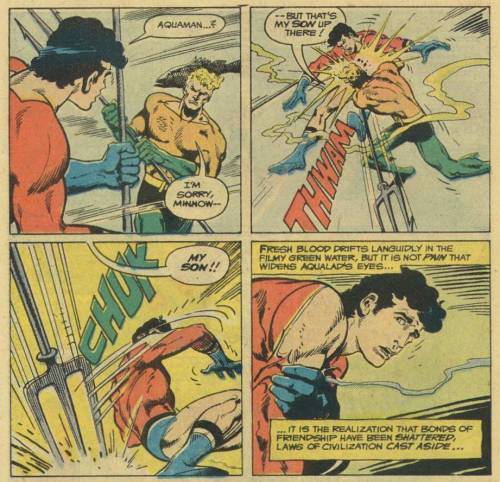
Arthur is willing to kill Garth to save Aquababy, because Aquababy is his son...with the implicit corollary that Garth isn't. The kid he has raised since, like, age 8, who has been by his side and living in his house all these years, is just...a sidekick.
(I think it's worth noting that Batman, who is not a good father, was once in a similar situation - Ra's al Ghul wanted him to pick whether Tim or Damian should die - and Bruce immediately chose himself. Arthur didn't even consider sacrificing himself for the boys. When you're a worse father than Batman, you know you've fucked up.)
I will say that in the early decades, comics only rarely explicitly referred to heroes and sidekicks as fathers and sons - you don't see it very often with Dick or Roy either. That's why all the sidekicks were wards and none of them were legally adopted. (Dick wasn't adopted until he was over 18; Roy never has been.) This was mostly to keep the heroes seeming young and fun instead of stodgy old dads.
But since the 70s on, Dick and Roy have been very frequently, explicitly stated to be Bruce and Ollie's sons, and the same is true for subsequent sidekicks: Jason was going to be adopted right away, Tim was going to be adopted whether he wanted it or not, Mia is clearly Ollie's daughter.
By contrast, I can only think of two times the Arthur/Garth dynamic has been described as paternal. The first is from Garth's debut:
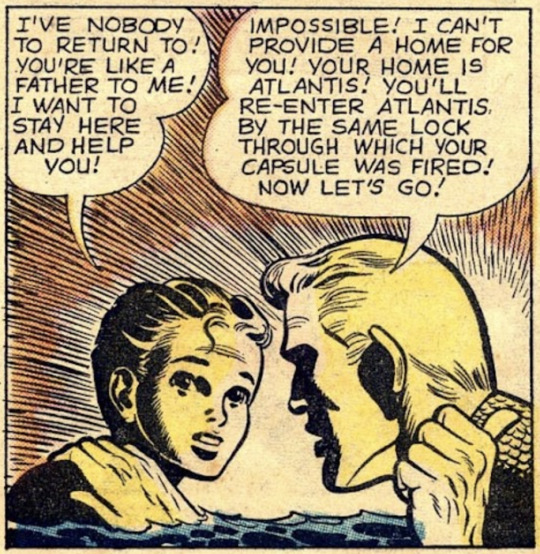
HE IS SO TINY. Also I can't stop laughing at how Arthur's like "Fuck that noise." TERRIBLE.
I can't remember exactly when the other instance was, but I want to say it was Arthur calling Garth his son in like...the early 2000s? Maybe the Jurgens run? It would've had to have been before the 2003 run, because Garth was not putting up with Arthur's bullshit from 2003 on, and then the New 52 happened.
But yeah, they don't use those words for each other...basically ever. (Lorena and Jackson are also not Arthur's children. To be fair, Jackson has two very alive parents so Arthur being like "YOU ARE MY SON" would be weird and inappropriate.)
I think another factor, though, is that Arthur isn't just Garth's former mentor and guardian - he's his king. A lot of the time, Arthur has very cold, formal relationships with almost everyone in his life who isn't Mera (and sometimes even her) or a literal baby. There's a certain loyalty Garth owes Arthur - or at least both characters seem to feel Garth owes Arthur, whether or not you or I might agree with that - that has nothing at all to do with family.
We also don't really know the Atlantean norms around this sort of thing. Like, we can extrapolate things about Ollie and Roy's relationship that aren't written on the page, but do Atlanteans even have differentiations between ward, foster, and adoptee? Do they differentiate between adoptee and biological child?
And combining both of those ideas, Garth being considered Arthur's son might have political ramifications. Does that put him in the line of succession? The comics have been wildly inconsistent on this (Titans called him a prince this month and I yelled "EXPLAIN YOURSELF, TOM TAYLOR" at the page), but one could headcanon that Arthur has very deliberately avoided formally recognizing Garth as his son for political reasons. (Unless he has and that's why Garth is apparently a prince now, like he was in the Jurgens run but no other time in history. EXPLAIN BOTH OF YOURSELVES, TOM TAYLOR AND DAN JURGENS.)
Anyway yeah, I mostly think you're right that it's just anti-adoption prejudice, but there are some other factors that make this situation unique among the many, many mentor/sidekick relationships in comics.
174 notes
·
View notes
Note
kacy i wanna know how much of a perv you think daniel is LOL so much fic centers on armand dragging him through an experience *armand* wants. so like what's the ratio of daniel being a freak in his nature (and knowing this about himself) vs armand nurturing this trait into him?
My friend, I’m so glad you asked.

THE THING IS IVE GIVEN THIS A LOT OF THOUGHT and in some ways it’s like, what all of my Devil’s Minion fics are about LOL. And yet! I don’t have a simple answer to this question, the way real questions of nature vs nurture are complicated in the real world in real people!
But let me sketch out a framework of the way I’ve questioned this, and everyone might come to different conclusions and that’s the fun of fandom, because there can exist several thousand versions of Daniel based on the same text! AND I KNOW YOU KNOW THIS STUFF, I HOPE IT DOESN’T COME OFF AS MANSPLAINING LMAO but I’m excited to talk about this topic.
Here’s what we know unequivocally from the text:
Daniel is 20 years old in IWTV.
That’s it, that’s the whole list.
And here’s some fanon that people often try to extrapolate from the text:
💦 That he met Louis at a gay bar. UNCONFIRMED, but I think it’s likely? In the short story the bar is named the Pink Baby, I think that might be a gay bar or a dick reference idk lol.
💦 Whether or not the Pink Baby was a gay bar, he and Louis essentially cruised each other and left the bar together! Daniel has the excuse that he’s hunting for interviews for his job, Louis has the excuse that he’s an apex predator who preys on people, but ? Take this wherever you need to. (Also blah blah Ricean biting=sex symbolisms.)
💦 Was Daniel bisexual outside of the assumption that most of the VC characters are bisexual/omnisexual? The only clue we get is that when he and Armand practice voyeurism, he hooks up with men and women. There’s a lot of interesting information packed into the voyeurism paragraph, like this line: Yet he lay empty afterwards, staring at Armand, resentful, cold. and I’ve seen the “resentful, cold” comment dissected many times in fandom. Is it the general resentment of their whole relationship? Is it because he wants to fuck Armand and not randos? Is it because he only wants the Blood? Does he not consent to being used like a zoo animal? Is he gay and doesn’t want to fuck women? Is he straight (minus the orientation-defying vampire attraction) and doesn’t want to fuck men? I’ve seen all kinds of takes on this LOL. But still, no real definitive answer about his orientation in the text.
💦 What did the “roaming the bars of the world” comment mean? Sometimes I read Anne Rice’s language as being kinda lofty and exaggerated but was he ACTUALLY traveling the WHOLE WORLD or is he hyping up that he trolled bars in the Bay Area? Is he FROM the Bay Area or was it a stop in his travels? He worked for a radio station (not in the book, but mentioned in the short story + The Vampire Companion and The Alphabettery) so did he live here, even if he traveled a lot? Was he wealthy before vampires if he was traveling this much, if you think he was a traveler?
AND AFTER ALL THAT, here’s some extra questions where Daniel is FREE REAL ESTATE that every fan has the freedom to make the fuck up:
💦 How much sexual experience did he have at 20? Do we assume that by default as an Anne Rice character he probably had ample teenage sexual experiences, and if he did, is there a quality over quantity aspect to consider? Is the sex we have as teenagers like, all that to write home about LMAO. Do we really understand kinks yet, or do we need to grow up and gain some perspective first?
💦 As an Anne Rice character, by default, do we assume he & everything else is sexually charged LOL, are the interviews and cruising and taking people home a code for bringing partners home? What percentage of his interviews were also hookups?
💦 When we talk about nature vs nurture for kinkiness, how micro and macro is this? As a fellow Off the Cuffs fan I know you understand the “radioactive spider bite into kink” concept, and some kinks are so specific to our experiences. But BEING KINKY in itself IS nature, isn’t it? I’ve read some sex & kink theory that kink is (psychologically) more like an innate orientation. IE: in the way you can be straight or gay, some people are also by default turned on by being smacked or by whatever paraphilia. Whatever that thing is, the way it takes shape, is the nurture half. But like, many people can have the same experience and 99% of them don’t develop a paraphilia right? So I think that capability exists in kinky folks at all times, especially when so many of the radioactive spider bites are things that people discover in childhood. ANYWAY I RANTED but I say that to say; DANIEL MOLLOY IS A MONSTERFUCKER, IWTV IS THE PROOF THAT HE IS A MONSTERFUCKER. IT WAS THERE THE WHOLE TIME.
So I bring up all those questions to encourage everyone to make up their own story with this, but I’ll tell you where I personally landed and how I approach it in my fics!!!
The Daniel in MY OWN fics is 20, single child, estranged from his parents, dropped out of college because he didn��t have ADHD support and was struggling, bisexual and promiscuous! I wonder if he went through that like college freshman thing where he got out of his parents house for the first time and partied a little too hard because he COULD! I like to read “bars of the world” as an exaggeration, I like to think he was a normal guy NOT globe hopping, sticking to the Bay Area, maybe he was out there for college, and guess what! There’s a thriving gay liberation culture there, so he finds some safe spaces to experiment with that!
However, I think the text leaves space to think he didn’t have a lot of close friends, or wasn’t close with his family, due to the way that he simply ✨fucks off ✨ after IWTV. NOW, that’s just me! Because there’s potential here for a TRAGEDY of people looking for him or grieving him! But idk I just like thinking that he was already on the outs and the interview pushed him over the edge.
So I ask like, does the 20 year old have a ton of kink experience? Is he good at sex? WHAT DOES RESENTFUL, COLD MEAN? Was he celibate during the chase years? Are the voyeurism sessions the first time he’s had sex since his old life? Even if he had random hookups during the chase years, was this qualitatively good sex? Can you truly get into good BDSM on a hookup or do you need a trusted partner? (This is subjective, idk, but!)
Also, how much kink is theoretical and private (to masturbate to) vs stuff you actually try? Especially if we believe that kink is nature, someone isn’t less kinky if they’re celibate, the way someone isn’t less gay if they’re celibate, or even a virgin. As Daniel becomes more and more obsessed with vampires, and with Armand, does it take over how he jerks off? Does he think about getting bitten? HE LIKES SNUGGLING WITH DEAD THINGS.
So like, there IS an element of Daniel being the unwilling witness of Armand’s rapidly shifting hyperfixations, and it’s natural that fandom pervs would extend that to sex acts and kinks. I LOVE IT, yes! It makes sense.
But when you say like, which one of them is in charge, I wonder if it’s relevant if we assume Daniel enjoys it. (Does he? Would he? Resentful, cold?)
Here’s some points that come to mind when I imagine it as purely Armand’s doing:
💦 People sometimes misunderstand BDSM dynamics when it comes to power and control, because BDSM is a consensual fantasy between two adults. The sub is just as in control, because they allow it. In that sense: Do we believe Armand respects Daniel’s consent? Would he force Daniel to participate if he wasn’t enjoying himself?
🩸 (How much can we compare this to Venice and how Armand was prepared for vampirism? I’m putting this in parentheses bc I’m putting a pin in this one, I CANNOT ADD A SUB-ESSAY INTO THIS POST ABOUT COMPARING VENICE TO DEVILS MINION but thinking of this too. Returning to the under-negotiated kink in Venice and how much is diegetic to the text, how does experiencing a spectrum of sexuality benefit someone’s last years alive ((sub-parentheses: does Armand flip-flop on turning Daniel as much as Marius did with Armand, does Armand subliminally know he’ll turn Daniel one day, does he go through these experiences as a precursor to turning Daniel eventually?)) are these experiences more for Armand to process the way he was groomed for asexual immortality vs being purely selfless and for Daniel’s benefit?)
💦 Armand uses Daniel as his usher into the modern age, and is it fair to assume he could sense Daniel’s kinkiness and knew that this was the person for him?
💦 How dubious is Daniel’s consent here? How addicted to Armand’s Blood is he by the time they start fucking around? Is he already within the throes of Ricean Omnisexuality where he’s down for whatever? Does the Blood influence this as well? Is there a secret subliminal violence creeping into your body when you’ve been drinking it again and again? What about less violent kinks, like your feederism fic? Does the Blood encourage all types of excess and consumption???
But if DANIEL is the driving force here, I still must consider:
💦 He meets Armand and his life essentially ends when he’s 20 years old. Was he really self-aware of his kinks? Did he know himself very well sexually yet?
💦 While exploring kinks can be mutually beneficial by sating Armand’s need for WEIRD HUMAN STUFF, maybe it IS something Daniel wants. It’s something he’s missing out on, because he checked out of regular human life when he was 20. Like, everyone’s different, so, I’m not saying that people can’t be sexually articulate at 20, but I know I fucking wasn’t! And I personally never fucked anyone that age who was good at it LMAO. So like how old would Daniel have been before he experimented enough to really know what he liked, and how much of him getting to know his sexuality involved Armand during the next decade?
💦 And this ties into Armand being his sugar daddy! That’s canon! Armand is his sugar daddy! If Daniel, at 28 years old, starts lamenting “I wish I’d gotten the chance to try watersports when I still had a normal life :( “ wouldn’t Armand have arranged that for him?
🩸 (Again let’s talk about Venice and what did Armand learn there about being the vampire lover, how much does he process and repeat on Daniel, and for whose benefit?)
💦 If Daniel is an innately kinky person, and realizes as he’s approaching 30 that he never really got to explore it properly, wouldn’t Armand usher him through that experience? Even if Armand didn’t plan to turn him, I wonder if he saw the window of Daniel’s mortal experience closing, maybe he worried that this is the type of thing people need to be wild about while they’re still so young. And outside of stigmatizing Daniel's age, it's also about how he was becoming less and less healthy, dying of alcoholism at 32, so there was a small window here for them to have sex adventures.
So basically, I’m saying that the nature half feels very much like Daniel being a monsterfucker, the nurture half is the actual experiences he got to have. And I don’t think he’d be in this situation in the first place if he wasn’t a bit of a monsterfucker, and wasn't a innately into danger and pain. Like, we don’t get a TON of examples but Gretchen and Babette didn’t try to fuck vampires! We know that vampires give humans the heebie jeebies! What kind of sick fuck is into that?!?!?!?
I don’t really have one single answer here. When it comes to the large library of kinks I think either of them can be blamed, and I also think it 100% makes sense to use Armand as a vehicle to write fic about them as if they’re another collection of human oddities for him to explore. But even using Armand’s weird bullshit to process that doesn’t mean it’s not mutually beneficial, and I think it gets into a fuzzier area that’s up to the writer when it comes to their take on the relationship, how dubious the consent is, how much do they actually like each other and get along? Can it be mutually beneficial in the end even if one person is driving? (see: the conversation about the second whipping scene in TVA and how it works out in the end.) Is it something they have fun agreeing to and negotiating in advance?
I can totally see how someone might write this as a fun thing that they talk about beforehand as easily as it could be Armand forcing mystery adventure on Daniel and suddenly he’s tied up in some shitty apartment in Hells Kitchen with some man pissing on him, and did he ever even reveal this kink to Armand or did Armand pull it out of his head?
The ship dynamic is so fucked up and coercive and resentful and toxic, even though there is real love here, so there’s this whole spectrum to use when you build your fanworks and headcanons!!!!!!! AND LIKE
IF IT’S COERCIVE AND FUCKED UP, DOES IT DRIVE THEM FURTHER APART OR BRING THEM CLOSER TOGETHER? IS DANIEL RESENTFUL AND COLD AND DOES THIS CAUSE FIGHTS? IS THIS A WAY FOR THEM TO PROCESS SOME OF THEIR COLDNESS AND RESENTMENT BECAUSE THEY AREN’T GOOD COMMUNICATORS? DO THEY DO BETTER AFTER THESE SESSIONS AND FEEL CLOSER BECAUSE THEY BROKE THROUGH SOMETHING NEITHER OF THEM KNEW HOW TO SAY?
Gosh idk.

Anyway I apologized in the beginning for mansplaining but I also want to apologize for this non answer LMFAO. I hope it doesn’t feel like a cop-out to not have a real answer, it’s just that I think there is such a rich context with a MENAGERIE of possibility !!!!!!!
#kink meta#deep ass thoughts about vampires#devil's minion#armand#daniel molloy#armand/daniel#vampire chronicles#am i writing meta on saturday night while im babysitting yes i am
75 notes
·
View notes
Text

House Sentences, Vol. 5
(Sentences from House (2004-2012). Adjust phrasing where needed)
"Can I ask what he's done to deserve your loyalty?"
"One day, our friendship will break, and it'll just prove your theory that relationships are conditional and you don't need human connection, or deserve it, or whatever goes on in that rat maze of your brain."
"You think I'm a bureaucrat with a badge, following some arbitrary guideline?"
"None of you are innocent. Not one of you."
"A bully's a bully. If they don't get a reaction, they'll lose interest."
"People think you have no inner censor. The fact is, you hold yourself back, because when you want to hurt, you know just where to poke a sharp stick."
"When I see people with their kids, it's so natural. It's like they have an instruction book imprinted on their genes. Maybe I just didn't get a copy."
"I did this to help you!"
"You need to believe that I've got a problem so that your betrayal has the illusion of nobility."
"Being different, you get used to people's idiocy."
"Only an idiot goes to prison for being stubborn!"
"We both know that my pride far surpasses my instinct for self-preservation."
"Normal's not normal if you're not normal."
"You could throw a dart at all the adjectives between arrogant and unhinged and I'm sure you'd hit one that describes me."
"I live in pain. Pain that on good days is merely intolerable and on bad ones will suck the life-force right out of you."
"You're not my mom! You don't have to keep checking up on me!"
"You find fault in everybody because you're afraid to look at yourself."
"You ever trust an addict? You ever give one the benefit of the doubt? How many times did it work out for you?"
"People like you, even your actions lie."
"I'm sorry, but I don't remember you."
"Does your voice always get that high and annoying when you're angry?"
"How can I help you this beautiful morning?"
"You owe me. I kept you out of jail; I can put you back."
"When you entered, I noted your shirt hadn't been pressed; you hadn't shaved in quite some time. I extrapolated you were a person for whom detail is not a major concern."
"You cannot make the uninteresting interesting."
"Why are you wearing perfume?"
"Is this a real case, or one of those imaginary cases that happen when you’re bored?"
"I'll get better. I always get better."
"Stop looking at my ass when you think I'm not looking!"
"Do you put all your patients through this many tests, or just the important ones?"
"I take it you two aren't sleeping together anymore?"
"I didn't realise you were going to get hurt. I'm sorry I misled you."
"No! I’m not getting sucked into the vortex of your insanity again!"
"That’s such a bad idea! There’s no way that won’t cause damage to the large intestine!"
"Are you keeping us here just to torture me?"
"The only difference between me and you is that I made some bad decisions, and you made some good ones."
"I don't like you. Never have, never will."
"I'm not breaking into somebody's house! I have principles!"
"Tone it down or I will hit you."
"I thought this was going to be fun. I mess with you, you mess with me - eventually, you give in. But you've shown a startling lack of humour."
"I approve of your shamelessness."
"Your hair makes you look like a hooker."
#rp meme#rp memes#roleplay meme#roleplay memes#rp prompts#roleplay prompts#sentence starters#specific;#medical drama;#filmtv;#House;
51 notes
·
View notes
Note
I have seen a post comparing Steven's adoption of Henry II in the anarchy with what the Velaryons did with the Strong boys wanting to justify that their claim is legitimate, but in my humble opinion it is not comparable at all. This situation could be extrapolated to Aegon II having adopted his nephew Aegon (that was the LEGITIMATE son of his political rival) having himself a living son, in addition everyone would know that he is not his son and well in this case it would not be applicable but the adopted heir retains his family name...This is not what happens with the Strong boys, It has nothing to do with the modern concept of adoption that they want to apply. I don't understand why it's so hard for them to accept that these guys had no real claim to the throne. They can continue enjoying their characters accepting that they are bastards in every sense of the word. Do you think they are comparable situations?
I haven't seen this argument myself but clearly those are two completely different situations. Stephen didn't adopt Henry II, he made him his heir as a compromise to end to the civil war. And yes, the clear parallel would Aegon II naming Aegon III his heir over Jaehaerys and Maelor, had they survived. Again, this was part of a peace treaty. Everyone knew who Henry II's parents were, and there was no question of his not being trueborn. Henry II was still Count of Anjou, the title he inherited through his father, and styled himself Henry FitzEmpress in honor of his mother.
To understand why this happened, we need to look at some context. Henry II was only 20 when he decided to re-take his mother's throne, and Stephen was past 60. At that point England had been at war off and on for the better part of 15 years and both the clergy and the lords were unenthusiastic about continuing and forced Henry and Stephen to the peace table after Henry made some early gains in his campaign. Stephen respected Henry, and Stephen's own sons were kind of uninspiring as future kings go. Eustace, the older son and main obstacle, died before Stephen did, and the younger son, William, agreed to renounce his claim. Stephen never really took the throne due to strong personal ambition in the first place, but because he was persuaded by people close to him that Matilda would be a poor choice for queen, both due to her being a woman and due to the influence of her husband, Geoffrey of Anjou, who was pretty well hated in England. Leaving the throne to his children did not seem to be a major consideration for him when all was said and done. Conceding heirship to Henry II meant that the fighting could come to an end, and the country would be in capable hands, but Stephen himself would not face the humiliation and possible consequences of being outright deposed. As it turned out, Stephen died not even a year later, so Henry II took the throne sooner than expected.
Rhaenyra's Strong children are bastards that she's trying to put into the line of succession while claiming they are trueborn. They were not "adopted" by the Velaryons. The medieval world did not have a concept of adoption like we do in the modern world (Rome did, but not medieval Europe). The reason why it is treason to call them bastards is because what Rhaenyra is doing is illegal, and Viserys, Corlys, and Laenor are shielding her from the consequences. I wrote a post here about the whole idea that Rhaenyra's children are not legally bastards, but I have to admit comparing them to Henry II becoming heir after Stephen is a new one!
#sometimes an ask appears that makes you set aside all other waiting asks and immediately hop on it#asks#historical parallels#hotd discourse#hotd meta#team green#anti team black#anti rhaenyra targaryen
34 notes
·
View notes
Text
Iruma & Kirio as foils, or: Why does Iruma still want Kirio?
TLDR: they want to own each other, mind your business
This won the poll of which meta to write up first, so let’s get into it. I’ve seen plenty of fan complaints about Iruma being “too forgiving” towards Kirio or blinded by love, and I think that misses the actual point of Iruma’s experience here, which is grounded in the way he and Kirio are not only foils, but fundamentally opposing forces.
(Disclaimer that I’m not saying “Kirio did nothing wrong” “uwu poor little meow meow” etc. I’m fundamentally not interested in whether a character “deserves” redemption, I don’t believe in punitive justice, justice is not even a major theme in Mairuma, and I think if any sort of justice is being brought into the interpretation, Kirio is most compelling when considered through a lens of transformative justice and societal-level questions.)
General Parallels & Kirio’s Side
We see them start from similar places: most highlighted is the way they are both basically disabled in terms of their magical ability, and rely on assistive devices provided by a “guardian figure” (loosely interpreted for Baal). What is highlighted less, but I think can be inferred from narrative framing, is the ways in which their ambitions are mirrored, based on their trauma/fears. We see in the Harvest Festival that Iruma’s trauma centers on his loneliness–that people will leave him, particularly if he can’t live up to the role he’s been given (more on that when I write up how psychological dehumanization plays into the story, but the narrative is quite explicit on Iruma’s trauma & abuse/neglect).
Extrapolating, we can see how loneliness is also at the root of Kirio’s choices. He’s been shunned by everyone, especially his own family, for his weakness. His mental break comes when the one person who would “smile at him” looks at him in despair. He explicitly approaches Baal “to look for those who are the same as me”--interesting that he seems to be reinterpreting his isolation as due to his “twisted nature” rather than his weakness now.
So, both Iruma and Kirio are given a place to belong from a “guardian figure”. During this time, Iruma begins to unlearn some of the unhealthy ways he coped with loneliness (doing anything for anyone for any ounce of positive attention), while Kirio is encouraged to deepen his (seeking others’ despair, pulling them down to his level; more on this and Baal’s manipulation in another essay).
Moving on, we can see how Iruma is antithetical to Kirio’s ambitions. Iruma is evidence that people can resist despair. He needs to make Iruma despair–it's not just "I want to see people despair and he won't give it to me"--for Kirio, despair is the organization of his life, explicitly stated as his “reason for living”. Kirio approaches Baal for community, says "I am broken," and Baal tells him that he is not a mistake, he is not alone, that the way he is is natural. Iruma calls all that into question. If despair is a choice people can avoid, then his identity collapses. It's not everyone's true nature--it's just him, he is alone, and he is a mistake. He could have chosen to resist despair, but he was either too weak or too twisted (either way, too broken) to manage it. The fandom gets distracted by the eroticism of cannibalism, but it is Iruma’s despair that is Kirio’s real goal. Whether Kirio realizes it or not, he needs Iruma to despair to justify his very existence.
Iruma’s Side and Existential Conflict
It may seem like Iruma cares so much about Kirio because of his issues prioritizing others over himself, but I believe his desire for Kirio is when he is at his most self-assured, and most selfish. After all, Iruma's ambitions are also impossible without Kirio returning to his side.
Iruma wants to belong in the netherworld, wants to remain by his friends’ sides, and ultimately wants to create a kind netherworld where people are encouraged to grow–basically, to protect and spread the love and opportunity that he was given. Meeting Kirio is his first real glimpse at these ambitions (@naoke666 has a great tongue-in-cheek analysis of this), and also the first time he must confront the true opposition to this ambition.
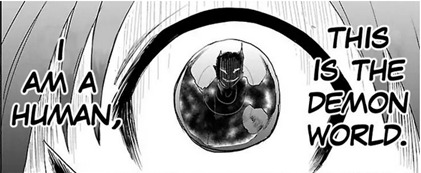
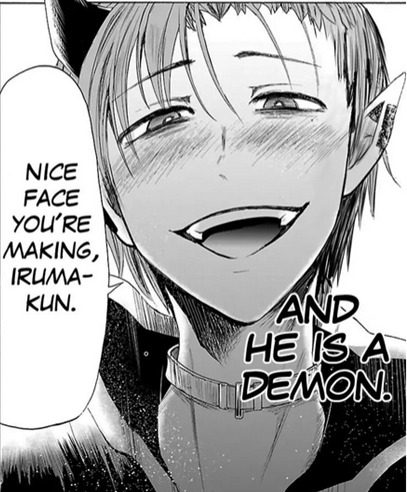
Here, I believe Kirio comes to represent the ultimate reality of demons for Iruma. He was warned about demons eating him from the beginning, but Kirio is his first actual exposure to the potential evils of the world that would make it uninhabitable for him.
Kirio wants a cruel world. Sure, he's not the only one, but the others are adults who have chosen this path again and again. It's not just what Kirio does or wants, but the idea that he represents demon nature. So it’s not that Iruma wants Kirio back because he doesn’t see how fucked up Kirio is–Iruma needs Kirio back specifically because of that. If Kirio really is what he says he is–fundamentally and naturally sadistic–if demons really will always naturally be like him, then Iruma existing in the demon world he wants is impossible. Sure, he could become strong enough to fight them off, but that wouldn't be a kind world. Iruma could kill Kirio, but that would only prove that Iruma must kill to survive. If Kirio is right, then even if Iruma defeats him in terms of power, Iruma still won't have the world he wants. If Iruma gives up on Kirio, he will admit that there are times he will have to give up, and he declared in their first conflict that he wouldn’t give anything up.
For both of them, it's not enough to defeat each other--each one needs to prove the other wrong to survive on the path they've chosen. They are locked in a tug-of-war, trying to pull each other to their side because that is the only way their "side" can continue to coherently exist. If they don't pull the other to their side, then the new world they want to create can't come to be. While Kirio needs to pull Iruma down to him, to feel the same despair he does, Iruma needs to pull Kirio up with him to be able to create the kind netherworld he wants.
I think it’s very narratively interesting to acknowledge that they are both epistemic/existential threats to each other. Obviously, Iruma’s is the happy outcome, but their desires for each other are still paralleled. In Kirio’s mind, Iruma “winning” would destroy him just as much as he plans to destroy Iruma–after all, Kirio believes that he can’t be anything other than what he is now, and if that were true, there would be no place for him in Iruma’s world.
Ultimately, though, I don't think this is a story that believes a child can just be fundamentally evil, and despite what we’re told about demon nature, what we’re consistently shown is that demons and humans aren’t very different–we all want to be loved, want to be acknowledged, want to strive. And even if you don’t buy any of this, Mairuma is a story about Iruma getting what he wants, and he wants Kirio. After all, Iruma declares that he loves demons, loves the demon world–Kirio, as the first person he truly recognizes as a demon, has to be there as well. (@mx-88 just posted a good Kirio redemption analysis you should check out as well.)
Anyway, that’s one Mairu-meta essay down. Hope to hear your thoughts/additions/polite contradictions!
52 notes
·
View notes
Text
I didn't want to run a tag essay on someone else's ask post just because it touched on my apparent Rant Button Topic and I kept going, but it's always so important to me to stress that deciding you can Tell who is part of the in-group and who isn't based on immediate first impressions is how you get outright accusatory gatekeeping, without even a middle step in between point A and point B. Not just with alter/nonhumanity‚ but with everything. When you do this, you implicitly think yourself immune because you know your own identity and it's obviously real‚ source: you—so you are the standard‚ it's obvious‚ and those who don't match up to it just wouldn't get it, just won't ever understand the complexity of your lived experience as part of an in-group they're not in-. If they insist, they might even be faking.
Can you tell I'm tired of other autistic people assuming I'm not autistic because we didn't relate to each other or me to their self-inspired understanding of how to define autism? How many other neurodivergent people have had a different experience of it throughout their life or to begin with, those whose autistic traits I couldn't relate to and therefore mine are just annoying or me being stupid, not autism? When someone decides they "know their fellows when they see them," they have already decided that their outspoken directness (for example) is the default autism, and someone else's inability to verbally explain complicated things disqualifies them.
You cannot smell the nonhuman on someone! If you think you can, you may be someone who has decided that your nature is the default and outside of that circle is everything orthohuman, facing someone quietly deciding the same thing about you, more than you'll ever know. In a community that's already by nature comprised of so many different species who are never going to instantly click and relate to each other because some of us are dogs and some of us are fish—what makes you confident you'll always know another alterhuman when you see one if you're a bluejay and you're interacting with fucking Count Orlock? See also: This guy claims to be autistic, but struggles to verbally explain complicated things and uses reticent or confusing language; clearly he's an obstinate neurotypical refusing to just speak in a clear manner about things, as everyone knows they're like. Don't consider he might be semiverbal or psychotic or traumatized or that that can even just be a trait of autism on its own.
Point of order 2: this mindset almost-always leads to a superiority complex. It's not about the misanthropic ideals, it's about feeling like you are the arbiter and when you sweep everyone else outside of your specials circle, they're whatever word your particular community uses for what Reddit has compassionately dubbed NPCs: every single other person on the planet who isn't you and your friends. Don't you just hate humans? Don't you hate looking at ugly humans being loud and obnoxious all over the place? I, too, love arbitrarily deciding which people are part of the out-group based on how aesthetically pleasing they are to my nonhuman eye. (How often, I wonder when I see these sentiments, are they being thought in the moment about a disabled or homeless person in public.)
This isn't just an alter/nonhuman thing, it has been a huge problem in the autistic community with people deciding "neurotypicals" are the root of all evil, transmascs especially deciding cis men can just never understand anything true and real, and since knowing I'm aro I have adamantly refused to engage with the "we're better because we're enlightened for being ace/aro" thing that is surprisingly common, but since that was the topic of the previous post, this goes out to the alterhuman community: I am once again asking you to stop making assumptions, let alone extrapolating from them the in-group's exceptionalism and the out-group's lack of an inner life.
Somewhere there is a bluejay being a stubborn human again for being oblivious to Count Orlock's intricate fictionkin experiences.
11 notes
·
View notes
Text
I'd like to think a little out loud about Amane's perception of Tsukasa's escape from his boundary, and his possible underlying emotional arc regarding Tsukasa... he's a difficult boy who doesn't talk about most of his feelings, particularly about Tsukasa... so all we can do for now, until he talks, is theorize. But let's go...
Before the shinjuu, Amane ominously speaks in metaphors about the moon, & believing in something being real, even if nobody else does. It's a pretty obvious allusion to Tsukasa. He also mentions forgiving something and someone, even if nobody else could understand or forgive them. Amane is devoted to Tsukasa-- that's the only way I can read this, personally.
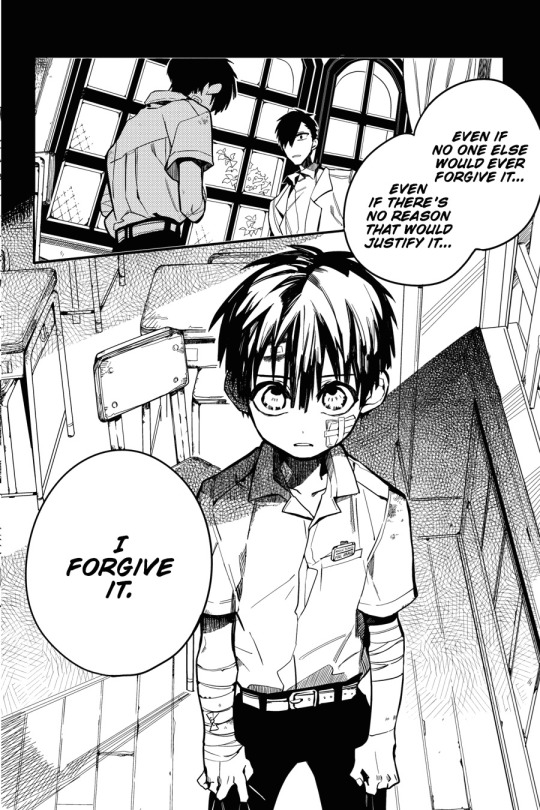

Amane in a recent chapter, revealed that his intention with the shinjuu was to save Tsukasa, & allow them to remain together.

we have seen that... perhaps in Amane's boundary, Tsukasa was kept in a stasis, enshrined in sakura blossoms, dressed in his regalia.

Tsukasa could only escape this boundary with the help of Sakura. We know Sumire could not leave her boundary without assistance, either. We also recently hear Tsukasa talk about needing to create your own exit from prison, & Amane... not responding to his cries for help, at some point.
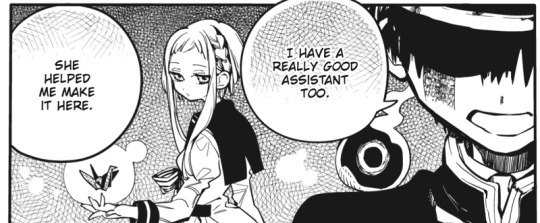
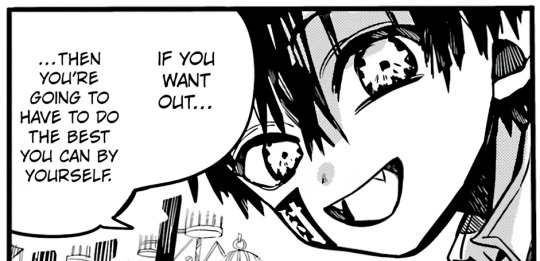
seeing Tsukasa like this makes Amane emotional. With this encounter, Tsukasa believes Amane is happy to see him.

Amane snaps violently & emotionally after this moment, slamming Nene-chan into the ground by her wrists, in much the way we expect him to treat Tsukasa. Was that gesture intended for Tsukasa? We don't quite know what it means, yet. We also don't know what expression Tsukasa sends towards Nene-chan before departing! Mysteries.
Amane is upset as the Mitsuba conflict ensues, & wants to know why Tsukasa is doing all of this-- and presumably, why he's gone through all of the trouble to escape the boundary Amane placed him in (for his own protection?)....
Tsukasa declares that he loved the moment Amane finally stopped holding back, & killed him.

Amane becomes ... overwhelmed, emotional, crying, vulnerable. I do not believe what he is feeling is fear of Tsukasa for being crazy or something, I believe what he is feeling is fear of being seen, fear of discussion & acknowledgement of his grand gesture, fear of addressing feelings he has (cowardly?) avoided (?) by keeping Tsukasa in stasis (?)....

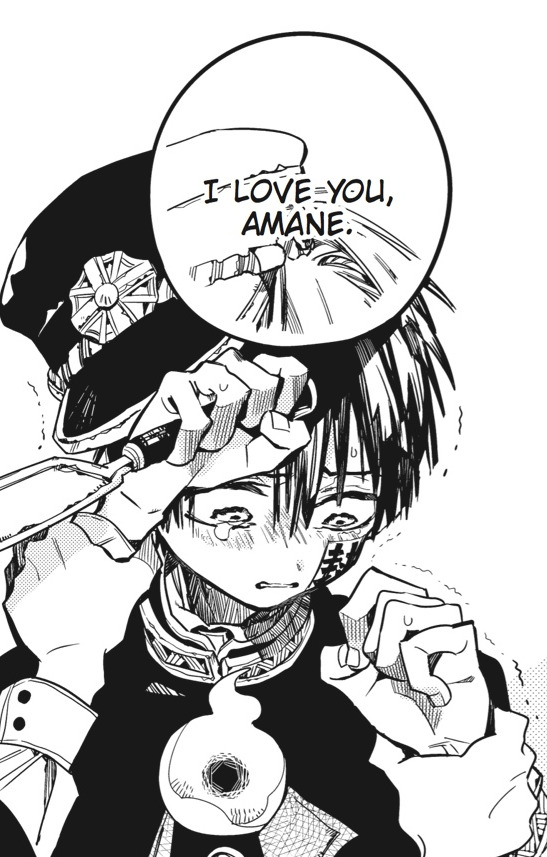
Amane, in response to this, shuts down & doubles down on his bleak belief system: that it doesn't MATTER if Tsukasa loves him, it doesn't MATTER because things can't be DIFFERENT, as a ghost, things can't CHANGE. Whatever regrets he had in life, whatever he failed to achieve with Tsukasa, whatever future he wished for of them... cannot come to be.
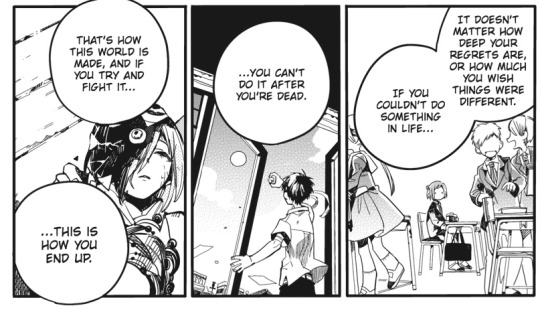
Amane & Tsukasa have no future, & nothing can be changed.
Clockkeepers happens, & Amane again doubles down on his belief system, of a fixed fate. There is nothing he can do to save Nene-chan.
By the Hell of Mirrors, I believe Amane .... begins to 'play' with Tsukasa. I personally believe Hell of Mirrors is essentially Amane & Tsukasa messing with everybody-- with Mitsuba & Nene-chan as their respective clowns. Tsukasa has playfully taken the role of Amane's 'rival', despite actually doing everything in service to Amane's wish. Amane plays at being Tsukasa's 'rival' back, and the entire 'fight' is extremely unserious for the two of them...
Let's say, extrapolating, that Tsukasa was a very suicidal person by nature. Let's say, that he never had the will to live, willing to trade his life for Amane's as a child, & willing to come back, knowing his death at Amane's hands is inevitable.
WE now know, Tsukasa has ONLY COME BACK, NOW, this time, in order to once again OFFER HIMSELF as a sacrifice for AMANE'S WISH. However, Amane, at this point in the manga-- volume 7-- doesn't seem to know Tsukasa's plan.
I think at this point, Amane is curious. Tsukasa escaped, Tsukasa is doing a lot of things. Maybe he's doing more specific and involved things than he ever has. Maybe Amane is curious what Tsukasa really... wants to do. Why can't they both be out, messing around, playing?
I don't personally think Amane never quelled Tsukasa out of an inability to OR a fear of him-- we regularly see him thrash, grab, throttle, scream at Tsukasa, we also see him nonchalantly peel the cuddly & clingy Tsukasa off of him without issue. He very clearly isn't actually afraid of being hurt by Tsukasa, and he DEFINITELY isn't afraid of telling Tsukasa what to do! I think Amane ALLOWED Tsukasa this freedom Tsukasa was suddenly inexplicably fighting for.
Picture Perfect rolls around, & Amane & Tsukasa are now blatantly working together, rather than the sloppy & makeshift playsession of Hell of Mirrors. Tsukasa created a circumstance, Amane collaborates with him. The goal of Picture Perfect is to permanently freeze Nene-chan in a painting, to functionally imprison her.
What Amane attempts to do to Nene-chan is not unlike what he had done to Tsukasa, in his boundary. In the name of "keeping you safe" or "saving you", Amane usurps their will, seeks to overtake their autonomy. It's easy to understand why Tsukasa thought this solution might be appealing to Amane... if he wanted to, he could keep Nene-chan in a kind of blind stasis.
I think Nene-chan makes Amane reflect on this impulse of his. I think Amane is scared to see himself... take this sort of path, all over again, with a living girl... with a girl with so much passion, optimism, so much possibility for herself....

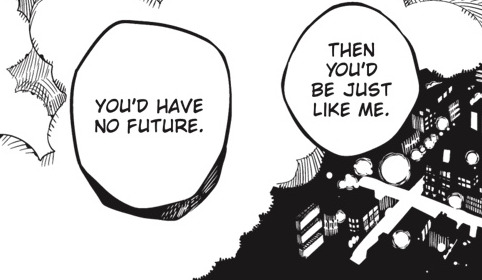
.... but I also honestly think... right now anyway... that Amane cannot trust Tsukasa to run his own life. That unlike Nene-chan, Tsukasa had no dream for his future, no wish to grow up, go to college, get married, etc. All he ever wanted was to see Amane, to learn about him, to see to it Amane had a happy future, or at least... had whatever he wanted, whatever that was.... even if what Amane wanted was to throw away his future.
Amane pivots into attempting to add life to Nene-chan's lifespan, something he couldn't have possibly done for Tsukasa.
Now.... I think a terrible sort of miscommunication, misunderstanding... occurs, here, at the far shore. It's still up in the air, but I want to do my best to propose the situation...
Here, Tsukasa once again affirms to Amane that he loved the shinjuu. Tsukasa, who gave up on his life multiple times-- who never seemed eager to live-- relates to Nene-chan's desire to die in the far shore, to forego her future, for Amane.

Tsukasa prods Amane to think about repeating his act of destruction, to once again erase Tsukasa's existence. Amane is seduced by the suggestion, for this moment. It is appealing to him, intoxicating.

Amane understands doing this, would mean dismembering Tsukasa with his own hands.
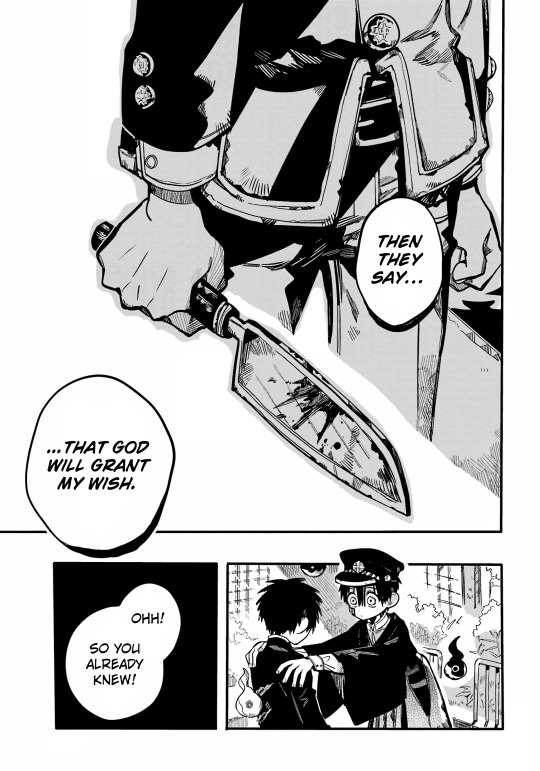
Tsukasa is surprised Amane apparently already 'knew' about this, had thought about it... even if in the back of his mind. Amane was destroying yorishiro this whole time. Why did he allow that? Perhaps... it was a self-destructive urge of a sort?
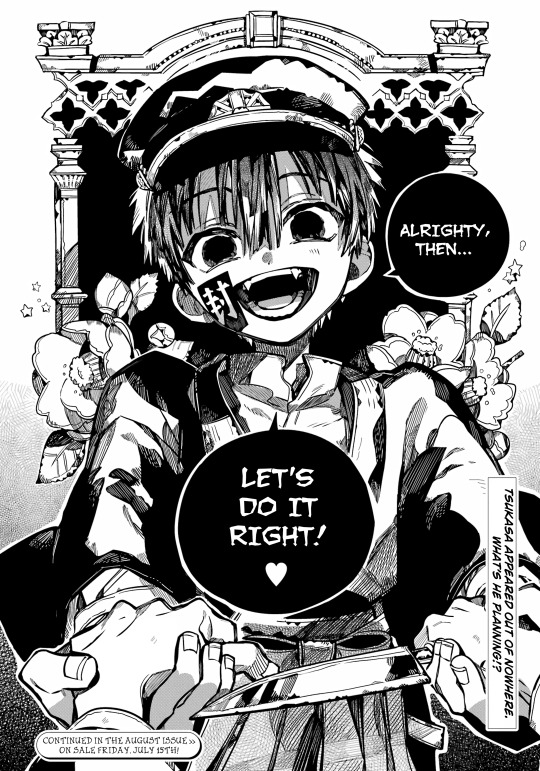
I think Tsukasa's glee, his acceptance, his urging for another dose, is.... something Amane is trying to understand.
At this point, I think Amane has every question in his heart: Did Tsukasa understand why Amane killed him? Did he understand the meaning of the gesture? Does he finally understand Amane's love for him? Amane threw away his entire future for Tsukasa. He was deeply devoted to him, & he attempted to show that devotion in the form of the shinjuu. Amane said something like, "if you have no future, then I won't, either. If you don't want to live, then I refuse to live on. I'm going to keep us together, forever; you can't ever leave me. I won't allow my self to have a future without you." with his actions. Amane can't say things with his words, typically. He is really... awful at words.
What could "do it right" mean? Amane was willing to just have Teru blast him to bits in the Far Shore, so obviously, he doesn't truly value his existence, even now. He is our self-destruction boy.
But perhaps Tsukasa and Amane could simply perform shinjuu pt2, but this time, Amane knows explicitly that Tsukasa loves it, loves him, & maybe even this time, Amane can be sure Tsukasa understands what it means, to sink into oblivion together. To not force it on Tsukasa this time-- but-- to have his consent, to both be self-aware, mutually. The commitment, the devotion he attempted to convey... Maybe!!!! MAYBE some tiny part of Amane THOUGHT that was what happened, in the Far Shore. Maybe he thought he could blast himself to oblivion with an elated, beloved Tsukasa who 'gets it', & save Nene-chan's life & future. Maybe HE could finally 'do it right'!
I think at this point... Amane doesn't know why Tsukasa is doing anything. But I don't think that is bleak, I think that is actually exciting.

There is so much left unsaid between them... I think, for a moment, Amane has a shred of hope, that he could learn something new about Tsukasa.... who he's been unable to understand, or do anything for. Tsukasa, who asks for nothing... Tsukasa, who only tries to die again & again, who can't seem to UNDERSTAND, SEE Amane's love for him. Who Amane can't communicate a thing to.
Buuut... I think this flicker of curiosity, hope, the dream of being seen, understood, of communicating together finally, is why Amane is now flipping out, deeply upset & distraught by Tsukasa's same insistence as ever in his own lack of value.
I think that is why Amane is snapping at Tsukasa, saying "I hate you". He feels like Tsukasa is rejecting him, won't let them be together... doesn't WANT to be together! Tsukasa is here, again seemingly only wanting to die, wanting to leave him BEHIND... this time! Is that "doing it right", actually? It's "right" to be separated? You can understand Amane's unbridled agony.... how it turns into pure anger.

Amane's feelings failed to reach his otouto!!! this whole time, I really think Amane feared that, more than anything.
His EXISTENCE-- AS HANAKO-- an existence HE ties exclusively to being with respect to his crime-- rendered meaningless! Confirmed to mean nothing! Tsukasa wants to disappear, and that's that.

The entire point of the shinjuu was missed! His gesture of devotion & love-- was nothing, the past decades enshrining him-- was nothing. Tsukasa thinks you hate him. He's thought you hate him this whole time. You're so cartoonishly far from sharing the beautiful consummation of a second shinjuu together.
You can understand then how the sense of rejection, being misunderstood, contorts in Amane's poor frenzied brain until it becomes his own violently-spat rejection-- "I get it now, you're not even REALLY my brother!!! You're fake!! My little brother wouldn't do this to me!!!! You're not my Tsukasa!!! you CAN'T be!!!"
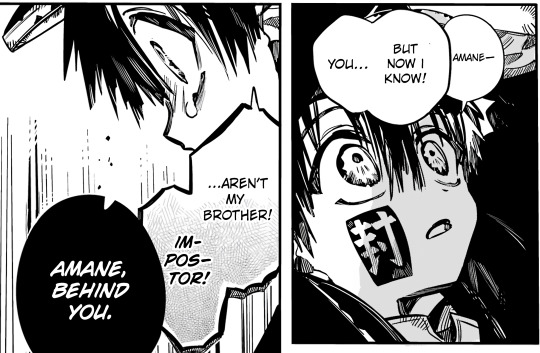
a very pathetic & childish response to rejection. "You can't reject me-- you're not even REAL! You rejecting me doesn't even mean anything!!! I'll reject your entire existence!!!" oh, Amane....
You can understand how Tsukasa simply watches the response... I think the intensity of it is interesting.
For a boy who likely once doubled down so hard on Tsukasa's authenticity.... it's an extreme 180. It's just a response to pain.
I think.... maybe we now, next, will explore, "what if Amane didn't do the shinjuu at all? What if Tsukasa simply disappeared for good, & Amane was left behind?" in a new timeline. This rejection of Tsukasa is an intense culmination of everything thus far... Amane's built-up curiosity, hope, feeling baited & seduced into imagining something satisfying, only to fall flat on his face. This timeline showed us the insurmountable extent of Tsukasa's belief in his lack of value, a belief so strong Amane cannot pierce it, not even if Tsukasa awakens adorned in silk in a bed of sakura blossoms.
.... but I can't pity Amane too much, because I swear to GOD if you'd only SAY "I love you", he would understand that. I'm sorry Tsukasa can't understand your abstract poetic gestures, Amane!!!!!!!! LOOK, IT'S HARD FOR NENE-CHAN TO UNDERSTAND THEM AS WELL--!
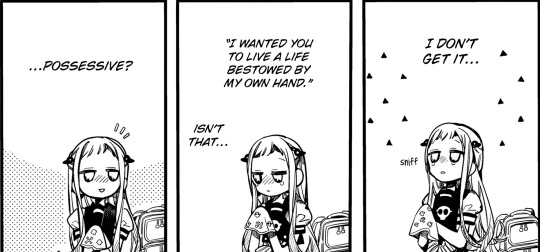
But she's a romance-loving cumrotted girl, she's better at this than Tsutsu.... she can miraculously kind of see through the gestures like , trying to murder another girl for her sake. it's very impressive of Nene-chan... but I think Tsukasa-chan needs you to... like, say it, very directly, okay!! We can't do the indirect stuff!!! I promise your otouto loves you, if you'd only do something like actually beg him to stay with you!!!!! But Amane isn't honest enough to do thaaaat....
in any event, as always, it's very hypocritical of Amane, who continuously keeps trying to leave Nene-chan behind, which often makes her feel rejected or confused. Why is Hanako always trying to leave her?
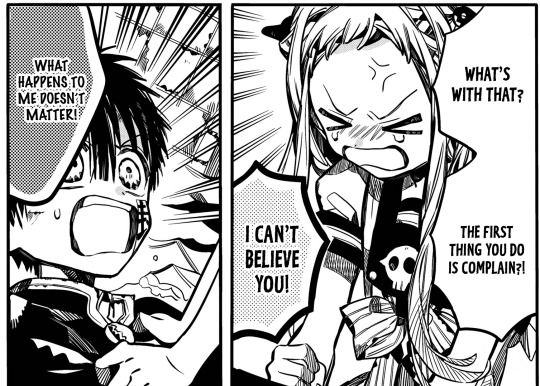
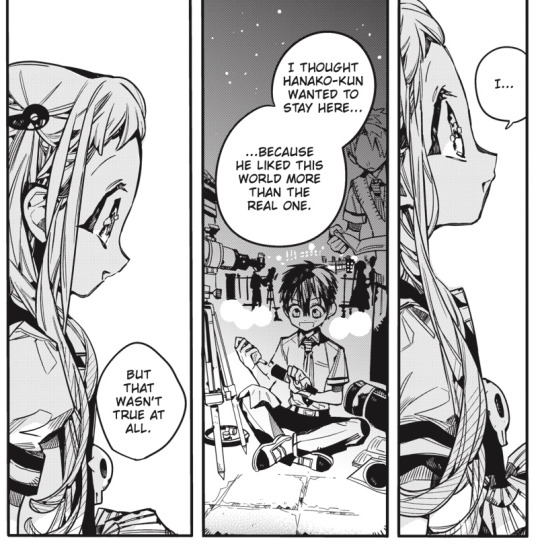

well, because he believes she couldn't have a happy or fulfilling life with him, who can't offer her anything she wants.
I'm sure Tsukasa feels the same way, Amane! I don't know what he thinks he can do for you! Aren't you better off without him?
Please-- Nene-chan... you have to help them. She has to see how much Amane needs Tsukasa, for herself... then, even if the Yugi can't tell each other clearly, she can tell them herself.
#avvy's JSHK#ive not proofread this but it's taken too long I suppose I will edit it later....#it's exhausting to think about you Amane!!!#I want the world for you. *slaps him*
27 notes
·
View notes
Note
Do you think Jay's womanizing could be explained by his father's and uncles' constant bragging about his conquests when he was growing up? It would make sense for him to turn out like you described, but the way he turned out in the actual show could also make a lot of sense if you imagine his father and uncles sharing TMI about their own sex lives or saying things like: "don't settle down, sleep with as many girls as you can, that's the life" or "you are twelve and you still haven't kissed a girl? You need to get right on it, you're behind!" This kind of upbringing would produce a womanizer but the show could have delved more into that and had Jay tell more stories about his home life than just "my mom is mad that I set the carpet on fire"
I think it's a plausible possibility -- without Jackie being his mother or in his life. But Jackie would've made Jay the center of her life, especially with Kelso stepping out in her regularly (a reasonable extrapolation based on his T7S characterization and their relationship in both T7S and T9S).
Jackie would not want Jay emulating his father, despite that -- or because -- she can't disentangle her romantic feelings from Kelso. While she's her T7S S1-S4 controlling and somewhat violent self to T9S Kelso, she could very well treat Jay in a much more loving way. We know she's capable of it with the right influences and motivation.
With a mom who respects, loves, and supports him, Jay would (hopefully) not develop the misogyny Kelso and his male siblings have due, in large part, to their mother's inability to parent so many children and give the attention each needs. As Eric tells Kelso in "Stolen Car" (T7S S1), Kelso's parents have seven kids and won't notice Kelso is missing or have the wherewithal to care that one was arrested.
Of course, Kelso's father is equally responsible. But from what we see of him in "Career Day" (T7S 1x18), he's not turned into his emotions. He's a worker, possibly a workaholic. He's not the dad to play a baseball game with his kids or take them to a baseball game.
But for Kelso and Casey, at least, their anger and resentment at their upbringing is transferred onto all women since their mother is likely the parent who was physically present and doing most of the parenting -- and probably at her wits' end with seven of them to raise.
Jackie has one child in T9S. Despite that she's a Jackie whose relationship with Hyde is cut from her core, her core still contains her potential to love unconditionally, her emotional insight, her reflex to be helpful and supportive, her potential to be self-aware. Jay would've gotten the best of Jackie while growing up with the discipline and boundaries Kelso is incapable of giving him.
For example, he wouldn't have stolen Nate's bike because Jackie would've made sure Jay had the best of everything, partly to (over)compensate for the father he has and her toxic relationship with him.
Kelso's sex talk(s) would consist of "doing it as much and as often as you can. That'll prove you're the hottest guy around, and everyone'll look up to you. Also, most chicks'll expect you to be monogamous. Just tell them you are and have sex with whoever you want. It worked for me. Your mom still married me --twice -- despite all the cheating I do -- I mean did. Yeah. 'Cause she'd rather be with the hottest cheater than the loserist monogamist."
(^^^ This is before the third divorce and third remarriage).
Jackie's sex talks would also be romantic relationship talks. First, she'd tell him to ignore everything his dad said. Then she'd say, "Find out who the girl you like really is. It's easy to ignore red flags if you want an idea of a girl badly enough. Don't mistake what's fantasy for what's real.
"If you don't want to be 'tied down' to one girl, that's okay. Just be honest with the girls you date. Let them know you aren't interested in being anyone's full-time boyfriend. Then they have the choice to hook up with you or not. You wouldn't want a girl you really, really like to lie to you about that, right? And being silent about the truth is the same as lying."
Jay might ask her why she stays "with Dad" or keeps going back to him.
Jackie says, "You are a wonderful, smart, creative boy. You can be whoever you want. Have what you truly want. Don't settle for less than what you're worth."
Jay says, "Wait ... are you telling me you settled for Dad? Why?"
Jackie says, "I'm telling you that you don't have to settle."
Jackie refuses to elaborate, but Jay wants to know why his great mom would settle for his not-so-great dad. This would be a driving force because it's an inextricable part of his own identity (as forged by his upbringing).
#that 70s show#that 90s show#that '90s show#jay kelso#jackie burkhart#ask#theonethatwatchesalotofshows#my meta#my essay#meta#essay#michael kelso
7 notes
·
View notes
Text
Gandalf the unreliable narrator
I am re-reading the story Gandalf tells Frodo about Gollum's origins and it is hilarious. Gandalf clearly makes most of it up. After all, there are basically no eye-witnesses or records to any of this save Gollum who spent a thousand years alone under a mountain and only told that story to Gandalf under torture, as we later learn. So here is what Gandalf tells:
people akin to Hobbits lived at the shores of the Anduin - that is an educated guess. He knows that Hobbits, allthough their own history goes only to the beginning of the Shire, have moved their relatively recently and must have come from the east, some of them even lived in the north of Rohan for a while. He also knows that Gollum had more in common with hobbits than any other species, including a love for riddles and memories of a life that could be hobbit-like.
Gollum came from the wealthiest family there, which was led by a matriarch - nope, Gandalf us making that up. Even if Gollum still remembered both his family and their wealth, despite living a lonely, independent and completely posession-less (except for the ring) existence, what exactly is he supposed to have told Gandalf about that?
Gollums real name is Smeagol - I mean, could be. Only he would know, maybe he told Gandalf that. Maybe he made the name up, maybe it was someone else's, maybe it was actually his. No way to tell.
He had a friend like Deagol - honestly, that sounds to me like Gandalf wanted another character in the story and looked at Hobbit naming conventions (Frodo son if Drogo). Other people where probably involved in the story, might as well call one of them Deagol.
Smeagol liked roots and beginnings, caves and deep pools - Gandalf is obviously extrapolating from Gollum living in a cave. Why Gollum would tell something like that, even if it true, is beyond my imagination. And I cannot imagine that as the only explanation.
Gollum's people swam a lot and build reed boats - well, Gollum swims well and has a boat, and if he hasn't developed boat building on his own, he probably was already proficient in it. And we assume his people lived at the river at least. But might as well have been a fisher man or shipwright by profession.
One day, Deagol and Smeagol made a trip to where there were nice flowers by the river, where Deagol went fishing and Smeagol looked at roots - well, that sounds like setting the scene. And I still am convinced that the whole Deagol-found-the-ring-first story was Gandalf's way of impressing onto Frodo that the ring can lead you to murder.
Deagol fished and found the ring when being dragged into the water by a fish - not even Gollum would necessarily have seen that part. It's as likely an explanation as any. And we know the ring was last seen on Isildur swimming through the Anduin.
Seagol looked at Deagol looking at the ring from behind a tree - Gandalf is not a bad storyteller
Gandalf quotes the direct words Smeagol and Deagol exchange, something I doubt Gollum would remember
Smeagol kills Deagol and hides the body so noone ever found it - again, this sounds to me like a warning message to Frodo more than based on what Gollum told Gandalf
When Gollum found the ring made him invisible, he liked to go around and sneak up on people, but they kicked him and he liked to bite their feet - bite their feet? Really?
In the end, Gollum was kicked out - well, I can see the resentment of that lingering, Gollum might have told that
He traveled up the Anduin and ended under the misty mountains after the sun became to strong to him - he must have somehow gotten from the Anduin to his cave, and he does not seem to have missed the sun. The rest I'd call speculation
While all of this is a very good story, we know Gandalf has very few sources:
his limited knowledge of Hobbit history
what Bilbo told him
what he found in the archives of Gondor
what Gollum told him under torture
I see very little of the story coming from any of these sources. So in conclusion, Gandalf made most of that up, partly to have a nice story, and partly to teach Frodo some lessons.
#the lord of the rings#lord of the rings#tolkien#tolkien meta#hobbits#frodo#gandalf#gollum#deagol#smeagol#the one ring#the fellowship of the ring
17 notes
·
View notes
Note
Okay so this is my first time actually doing an ask in Tumblr, so apologies if I'm doing something wrong/breaking any conventions but
What if an AU version of Edward who has the same backstory of how he turned a Vampire and the Cullens and and still has an infatuation with Carlisle, but is aware of his interests accepts the fact? Like what change in his personality would cause this, and how exactly would this different Edward act? Would the Cullen family implode any sooner?
The ask is perfectly fine, there's no real set format to these things. Just that if you want to answer please, for the love of god, do not repeat something I've already answered.
That said, you say it yourself anon, this would be a completely different person. If Edward was different he would be different.
This is where we start wandering into write the fic territory because for Edward to do what you say he has to be extremely different in fundamental ways that make it hard for me to extrapolate what happens from there.

(gif credit @franzias-cave)
If Edward is accepting does he accept it as unrequited or does he work to gain Carlisle's interest? Does he still accept Esme into the fold or does he now reject her as competition? If he's accepting is he also open with the fact, the family now knowing and reacting, or has he kept it hidden and how would that inform him and his decisions.
If we do manage to, somehow, get to canon all the way unscathed and Edward's basically the same except "secretly gay and cool with it" then probably we get to this picture.
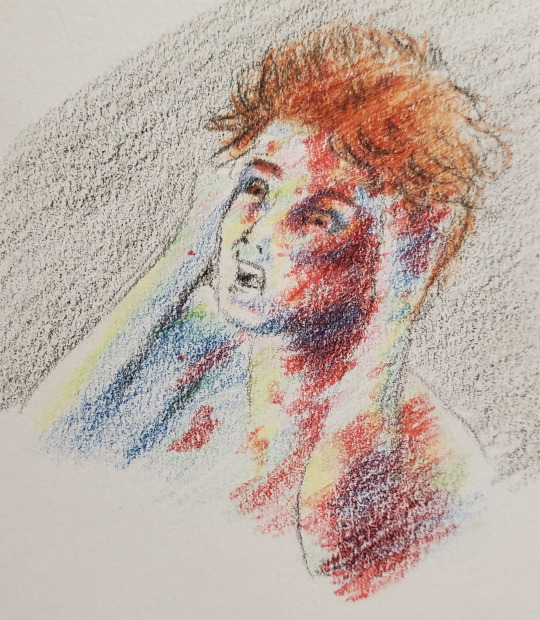
As remember there are only two doors for Bella Swan where Edward is concerned: he will either eat her or he will turn her into a vampire. He only did the latter in canon because he both had little choice and believed himself to have romantic feelings for her.
The thing about Edward, is even if Bella acts the same canonically to draw in his interest, is he likes the idea of true love and having only one true love. He's very enamored with the idea that Bella alone is the love of his life, he's been waiting for her all this time, and that when she dies there will never be another person for him. Part of this is just being a dramatic teenager having feelings but another part is that he wants to be a person who is very true to his feelings and unfaltering. Those he respects in his family he sees as having only ever loved each other in their lives and never, ever, falling apart for any reasons. His coven is different because they feel love in a way no other vampires can without partaking in the Cullen diet.
Edward doesn't want to be a person who can have feelings, even attraction, to more than one person in his life.
The trouble is here if he's attracted to Carlisle, let alone in love with him, and knows this and admits it to himself...
Then he can't be in love with or attracted to Bella without despising himself for being untrue to his own feelings. Which means... he can't choose the door where Bella becomes the bride of Dracula at the end of the day, can he?
#twilight#twilight meta#twilight headcanon#twilight renaissance#edward cullen#anti edward cullen#edward/carlisle#anti edward/carlisle#edward/bella#anti edward/bella#meta#headcanon#opinion
26 notes
·
View notes